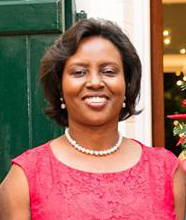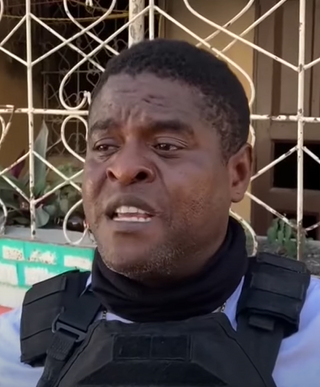Related Research Articles
The recorded history of Haiti began in 1492, when the European captain and explorer Christopher Columbus landed on a large island in the region of the western Atlantic Ocean that later came to be known as the Caribbean. The western portion of the island of Hispaniola, where Haiti is situated, was inhabited by the Taíno and Arawakan people, who called their island Ayiti. The island was promptly claimed for the Spanish Crown, where it was named La Isla Española, later Latinized to Hispaniola. By the early 17th century, the French had built a settlement on the west of Hispaniola and called it Saint-Domingue. Prior to the Seven Years' War (1756–1763), the economy of Saint-Domingue gradually expanded, with sugar and, later, coffee becoming important export crops. After the war which had disrupted maritime commerce, the colony underwent rapid expansion. In 1767, it exported indigo, cotton and 72 million pounds of raw sugar. By the end of the century, the colony encompassed a third of the entire Atlantic slave trade.

Port-au-Prince is the capital and most populous city of Haiti. The city's population was estimated at 1,200,000 in 2022 with the metropolitan area estimated at a population of 2,618,894. The metropolitan area is defined by the IHSI as including the communes of Port-au-Prince, Delmas, Cite Soleil, Tabarre, Carrefour, and Pétion-Ville.

Jean-Jacques Dessalines was the first Haitian Emperor, and leader of the Haitian Revolution, and the first ruler of an independent Haiti under the 1805 constitution. Initially regarded as governor-general, Dessalines was later named Emperor of Haiti as Jacques I (1804–1806) by generals of the Haitian Revolutionary army and ruled in that capacity until being assassinated in 1806. He spearheaded the resistance against French massacres upon Haitians, and eventually became the architect of the 1804 Haitian Massacre against the remaining French residents of Haiti, including some supporters of the revolution. Alongside Toussaint Louverture, he has been referred to as one of the fathers of the nation of Haiti.

Michel Joseph Martelly is a Haitian musician and politician who was the President of Haiti from May 2011 until February 2016.

The Rally of Progressive National Democrats is a political party in Haiti.

Pétion-Ville is a commune and a suburb of Port-au-Prince, Haiti, in the hills east and separate from the city itself on the northern hills of the Massif de la Selle. Founded in 1831 by president Jean-Pierre Boyer, it was named after Alexandre Sabès Pétion (1770–1818), the Haitian general and president later recognized as one of the country's four founding fathers.

Jovenel Moïse was a Haitian entrepreneur and politician, who served as the 43rd president of Haiti from 2017 until his assassination in 2021. He assumed the presidency in February 2017 after winning the November 2016 election. In 2019, Haiti experienced widespread protests and unrest. In the early morning of 7 July 2021, Moïse was assassinated, and his wife Martine was injured during an attack on their private residence in Pétion-Ville. Claude Joseph assumed the role of acting president in the aftermath of Moïse's assassination.

Protests began in cities throughout Haiti on 7 July 2018 in response to increased fuel prices. Over time, these protests evolved into demands for the resignation of Jovenel Moïse, the then-president of Haiti. Led by opposition politician Jean-Charles Moïse, protesters stated that their goals were to create a transitional government, provide social programs, and prosecute allegedly corrupt officials. From 2019 to 2021, there were massive protests calling for the Jovenel Moïse government to resign. Moïse had come in first in the 2016 presidential election, for which voter turnout was 21%. The 2015 elections had been annulled due to fraud. On 7 February 2021, supporters of the opposition allegedly attempted a coup d'état, leading to 23 arrests, as well as clashes between protestors and police.

Claude Joseph is a Haitian politician who served as Minister of Foreign Affairs and Worship from 4 March 2020 to 24 November 2021, and served as acting Prime Minister of Haiti from 14 April 2021 to 20 July 2021, and acting President of Haiti from 7 July 2021 to 20 July 2021.

Jovenel Moïse, the 43rd president of Haiti, was assassinated on 7 July 2021 at 1 am EDT (UTC−04:00) at his residence in Port-au-Prince. A group of 28 foreign mercenaries, mostly Colombians, are alleged to be responsible for the killing. First Lady Martine Moïse was also shot multiple times in the attack, and was airlifted to the United States for emergency treatment. Later in the day, USGPN killed three of the suspected assassins and arrested 20 more. A manhunt was launched for other gunmen as well as the masterminds of the attack. Haitian chief prosecutor Bedford Claude confirmed plans to question Moïse's top bodyguards; none of the president's security guards were killed or injured in the attack. US authorities have since arrested eleven suspects alleged to have conspired in the assassination. Martine Moïse and Claude Joseph, who succeeded Moïse as President of Haiti, have been accused of conspiring in the assassination and were formally charged on 19 February 2024.

Martine Marie Étienne Moïse is the former First Lady of Haiti and widow of assassinated Haitian President Jovenel Moïse. She served as the first lady from 7 February 2017 to 7 July 2021. Moïse was wounded during the early morning attack on their home in Pétion-Ville that left her husband assassinated.

Ariel Henry is a Haitian neurosurgeon and politician who has served as the acting prime minister of Haiti since 20 July 2021, after the assassination of president Jovenel Moïse. He is also serving as the acting Minister of Interior and Territorial Communities. He became involved in a controversy due to his refusal to cooperate with the authorities over his links with Joseph-Félix Badio, one of the suspects accused of orchestrating the assassination of Jovenel Moïse on 7 July 2021. Officers who investigated the case suspected Henry was involved with planning the assassination.

Jimmy Chérizier, nicknamed Barbecue, is a Haitian gang leader, former police officer, and warlord who is the head of the Revolutionary Forces of the G9 Family and Allies, abbreviated as "G9" or "FRG9", a federation of over a dozen Haitian gangs based in Port-au-Prince. Known for often making public appearances in military camouflage and a beret, he calls himself the leader of an "armed revolution". He had close connections with the Haitian Tèt Kale Party and was closely allied with former Haitian president Jovenel Moïse until his assassination in 2021. Considered the most powerful gang leader and war criminal in Haiti, he is also currently believed to be one of the country's most powerful figures. He is believed to be responsible for numerous large-scale massacres against civilians in the Port-au-Prince area.
Joseph Lambert is a Haitian politician who served as the president of the Haitian Senate from 2021 to 2023. Lambert had previously been the president of the Senate from 2006 to 2008 and from 2018 to 2019. He was sanctioned by Canadian and American authorities for his involvement in the global illicit drug trade, corruption, and gross violations of human rights on 4 November 2022.
The 400 Mawozo gang is the largest gang in Haiti, mainly based in Ganthier and in Port-au-Prince's Tabarre and Pétion-Ville. It largely consists of deportees, former leaders of opposition groups, former smugglers and police officers. In 2022, it aligned itself with "G-Pep" after its leader was extradited to the United States. It came to international attention in October 2021 when it kidnapped U.S. citizens acting as missionaries in Port-au-Prince, Haiti.
Events in the year 2022 in Haiti.
Eric Jean Baptiste was a Haitian politician and entrepreneur who served as the leader of the Rally of Progressive National Democrats from 16 August 2018 until his death on 28 October 2022. He was a candidate in the 2015 presidential election, representing the Mouvement Action Socialiste (MAS) party.
The socioeconomic and political crisis in Haiti has been marked by rising energy prices due to the 2022 global energy crisis, as well as protests, and civil unrest against the government of Haiti, armed gang violence, an outbreak of cholera, shortages of fuel and clean drinking water, as well as widespread acute hunger. It is a continuation of instability and protests that began in 2018.

Since 2020, Haiti's capital, Port-au-Prince, has been the site of an ongoing gang war between two major criminal groups and their allies: the Revolutionary Forces of the G9 Family and Allies and the G-Pep. The Government of Haiti and Haitian security forces have struggled to maintain their control of Port-au-Prince amid this conflict, with gangs reportedly controlling up to 90% of the city by 2023. In response to the escalating gang fighting, an armed vigilante movement, known as bwa kale, also emerged, with the purpose of fighting the gangs. On 2 October 2023, United Nations Security Council Resolution 2699 was approved, authorizing a Kenya-led "multinational security support mission" to Haiti.

Ernst Julme, known as Ti Greg, was a Haitian gang leader. He was reportedly the head of the Delmas 95 gang.
References
- ↑ Salmon, Santana (August 8, 2022). "Former Haitian senator Yvon Buissereth assassinated in upscale neighborhood".
- ↑ "Gangs kill former Haitian senator amid spike in violence". August 7, 2022.
- ↑ Times, The Haitian (August 8, 2022). "Ex-senator, family member burned alive in Pétion-ville". The Haitian Times.
- ↑ "High-profile Haitian politician killed in apparent gang attack -reports". www.yahoo.com. 29 October 2022.